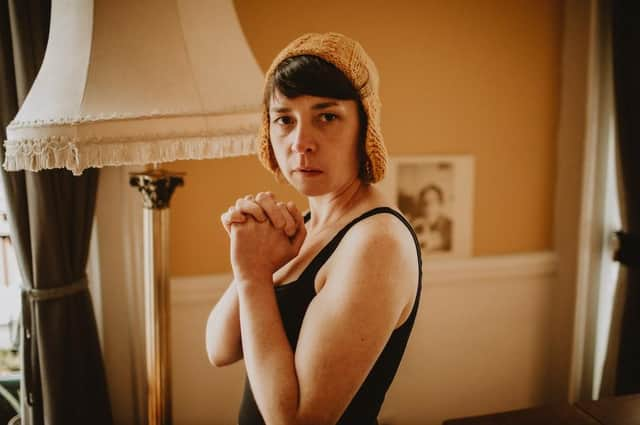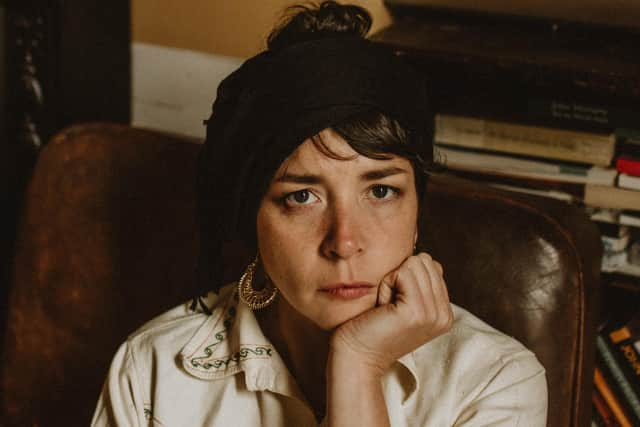Lisa O'Neill: 'When I listen to Leonard Cohen’s records, I feel like I’m reading'


“Then another way of looking at it is when I signed the record deal with Rough Trade,” she says. “That would be another instigator of ‘well, you have to do another now’.”
The title track was written in 2020 in response to a collaboration with Dublin’s Abbey Theatre on Patrick Kavanagh’s poem The Great Hunger. O’Neill says: “That was when I really felt like I can see the album now because these other four or five songs here are falling in line. There are so many threads within this subject that I wrote All This is Chance about that are echoing the other songs and now I can feel the general landscape for an album. It’s a journey.”
Advertisement
Hide AdAdvertisement
Hide AdThe long-playing format is something she is a keen “advocate” of, preferring “a 45-minute record where it becomes the soundtrack of a year in your life, it doesn’t end after one song, you know what’s coming next and that fits an emotion” to the pick ’n’ mix, instant gratification culture of streaming.
The topics in Kavanagh’s The Great Hunger, about a potato farmer’s musings on life and religion, certainly resonated with the 40-year-old, who is renowned for her earthy songwriting. “Kavanagh was looking at some of the subjects 80 years ago, I thought maybe things haven’t changed all that much or maybe they have a little bit. It was interesting for me to see the progression in society and even my own thinking by reading the work of a local man.
“Kavangh comes from the county next to mine – he’s from County Monaghan and I’m from County Cavan, only an hour away. Even his choice of words – I can hear his accent, his terminology, the way he put things was very familiar to the way my mother’s people would speak. I found that all not just nostalgic but reassuring.”
Although “surrounded by books”, O’Neill says she “would be lying” if she said her songwriting inspirations were often literary. “Of course I’m interested in reading, but it wouldn’t be my go-to,” she says. “I’m a listener. It’s somewhere in between.” She prefers to listen to somebody tell a story. “That could be in the form of an audio documentary, an audio book or in songs. When I listen to Leonard Cohen’s records, I feel like I’m reading. The poets are everywhere, they’re not just in the books.”
Advertisement
Hide AdAdvertisement
Hide AdHer interest in the natural world – and our increasing separation from it in the 21st century – was something she pondered on during lockdown. “It’s a recent thing, this disconnect, and we can look at it on many levels,” she says. “We can look at the big obvious backdrop which we’re still uncomfortable with addressing, which is climate change. That’s the backdrop to everything.


“No matter what we talk about around the dinner table this evening or in an interview or whatever we’re marketing or where our life is at and what we find important, there is no denying this.
“A lot of us sort of are in this stunned, shock mode about that, so that’s surely weaving through the album. Then we can rewind 80 years to Kavangh talking about the relationship with the land, but in not such a freeing, unhealthy almost, way. A lot of people after the famine here in Ireland had a different relationship with the land where they felt if they did have a little bit of land it was life or death to hold on to it. Kavanagh is looking at the idea that there has to be more to life, there has to be the spirit and the imagination.
“But then in music and in folklore and in the way we communicate today, the way we farm and our relationship with the land, I’m interested in a lot of things and I’m really only scratching the surface of them. I still feel such a very young student in the things that I’m curious about, like the Aboriginal people of Australia and their relationship with the land and how they held all their knowledge within a song, and the trees around them. They had such a relationship with the seasons.
Advertisement
Hide AdAdvertisement
Hide Ad“Here in Ireland, and in England as well, up until very recently, we’re talking maybe in the last 50 or 60 years, we’ve stopped depending on the land and it became like we have a choice – someone else farms and we just buy it in the shops. That’s quite recent, and because of that we’ve become consumers rather than listeners. We used to have to listen to the seasons, it was a matter of survival, to celebrate the seasons and have a better relationship with the animal world as well. Sure, we were still hunting back then but not farming the way we do today in such a cruel way.”
She says she was watching a David Attenborough documentary the night before, noting: “Our ecosystem is everything, we can’t survive on the Earth without it, and it’s struggling. We’ve plugged out somehow, and I can’t help thinking the way we communicate on the internet is not helping. The internet is fantastic in a way, we’ve got access to all the information we need, but we’ve stopped stepping into the information and listening. I’m not an ecologist, I’m not really an authority on anything, I’m a songwriter and an observer and I just sense that.
“Also, our wildlife is in trouble – butterflies or birds, our topsoil, the bees, ants, everything. I am trying to weave all that metaphorically into the songs. They can feel quite dark and painful, but us one-legged creatures still walking around on the Earth, there is a bit of a superior buzz about us. All these other insects are not just cute, they’re part of our ecosystem and they’re struggling, and they’d survived for so long before we arrived. So there are a lot of mixed emotions in the album but it’s me figuring it all out. It’s instinct and feeling, I don’t have it sussed.”
In the song If I Was a Painter, O’Neill addresses the generational gap that’s been accelerated by technology. It was a subject that struck her as she sat watching people on their mobile phones while travelling on London’s Tube trains. “Of course it was exaggerated on the Tube,” she says. “The speed of it is so fast, it’s unreal, it’s the opposite to the pace of how we would walk through a meadow. And I suppose (I felt) nostalgia for who built it. Working class people built the Tube lines, dug down into the underground, it was hard work. A lot of those people were Irish and English and Scottish, but working class. And it would’ve been at the opposite speed to what the mechanism does today. Hard graft and it’s very admirable when you think of the sweat and blood that went into digging those tunnels. The people were the machines, and now people step onto it and their heads are buried in machines and they’re not looking up.
Advertisement
Hide AdAdvertisement
Hide Ad“You might see some old, lonesome men sitting on that Tube and nobody notices them, and I wonder ‘Did he build this?’ I’m coming from not such a busy city but I am in awe. I love London, by the way, this is nothing derogatory here, but it’s such a busy city, it turns up the speed of my generation, they are all looking down in this moment when I’m on the Tube thinking about the decades that came before here and this Underground, and I do find the whole thing quite sad. I do think that the old people are getting forgotten. Their wisdom is so valuable to us more than ever, but there’s a lot getting lost in how quickly we’re moving today, in folklore, in how we carry stories and the value of them. How many people actually do think when they walk down into the Underground about its history and who built it and who lived and died in it?
“I’m very sensitive in that way when I’m on walkabout travelling and can feel really heightened and thrilled by all the history of people who would have made their way in and out of London over the years. It’s not just negative. But I do feel that my generation are moving so fast, I can’t keep up myself. It doesn’t feel natural, my soul gets left behind.”
Latterly O’Neill’s profile has been raised by her recording of Bob Dylan’s All The Tired Horses, which featured in the final episode of hit TV show Peaky Blinders, although she says she has yet to notice it herself as she has “not been out in the world so much since” the series was broadcast last April.
“There are definitely some more younger fans coming along saying they’ve found me through that, but I think that’s still early in its journey how that has an effect,” she says. “It certainly had an effect on me and my belief in connecting to the area of art that I would only dream of connecting to, and the next thing you’re being asked to collaborate in the world that you only until this moment dreamed about, so it’s great for my confidence.
Advertisement
Hide AdAdvertisement
Hide Ad“I don’t know what effect it’ll have on my career...I’m not really up on the social networks, but it definitely has more hits than anything I’ve released.”
All Of This is Chance is out now. Lisa O’Neill plays at Howard Assembly Room, Leeds on March 16 and The Crescent, York on March 17.
